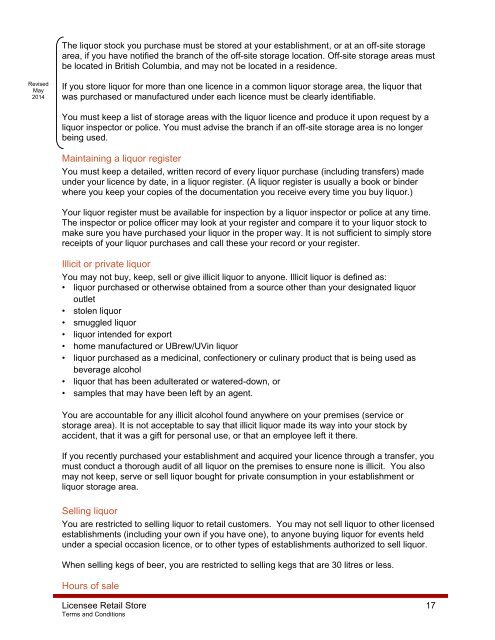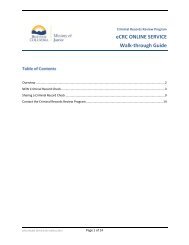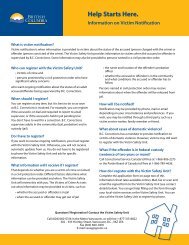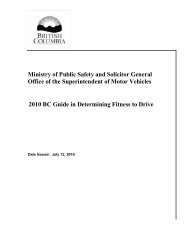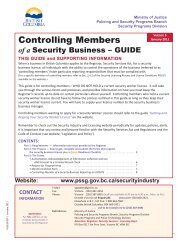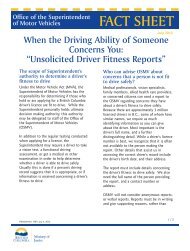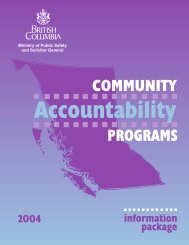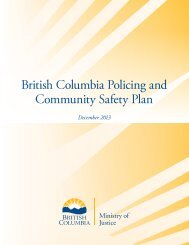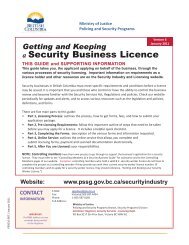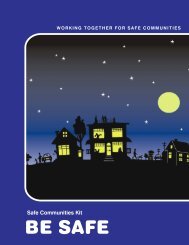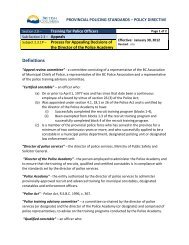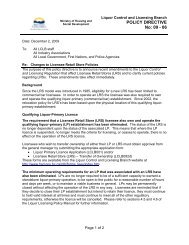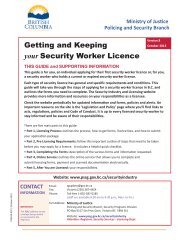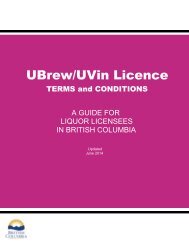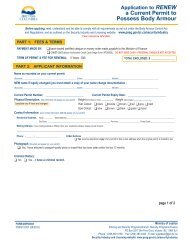Licensee Retail Store Licence Terms and Conditions guide
Licensee Retail Store Licence Terms and Conditions guide
Licensee Retail Store Licence Terms and Conditions guide
Create successful ePaper yourself
Turn your PDF publications into a flip-book with our unique Google optimized e-Paper software.
The liquor stock you purchase must be stored at your establishment, or at an off-site storage<br />
area, if you have notified the branch of the off-site storage location. Off-site storage areas must<br />
be located in British Columbia, <strong>and</strong> may not be located in a residence.<br />
Revised<br />
May<br />
2014<br />
If you store liquor for more than one licence in a common liquor storage area, the liquor that<br />
was purchased or manufactured under each licence must be clearly identifiable.<br />
You must keep a list of storage areas with the liquor licence <strong>and</strong> produce it upon request by a<br />
liquor inspector or police. You must advise the branch if an off-site storage area is no longer<br />
being used.<br />
Maintaining a liquor register<br />
You must keep a detailed, written record of every liquor purchase (including transfers) made<br />
under your licence by date, in a liquor register. (A liquor register is usually a book or binder<br />
where you keep your copies of the documentation you receive every time you buy liquor.)<br />
Your liquor register must be available for inspection by a liquor inspector or police at any time.<br />
The inspector or police officer may look at your register <strong>and</strong> compare it to your liquor stock to<br />
make sure you have purchased your liquor in the proper way. It is not sufficient to simply store<br />
receipts of your liquor purchases <strong>and</strong> call these your record or your register.<br />
Illicit or private liquor<br />
You may not buy, keep, sell or give illicit liquor to anyone. Illicit liquor is defined as:<br />
• liquor purchased or otherwise obtained from a source other than your designated liquor<br />
outlet<br />
• stolen liquor<br />
• smuggled liquor<br />
• liquor intended for export<br />
• home manufactured or UBrew/UVin liquor<br />
• liquor purchased as a medicinal, confectionery or culinary product that is being used as<br />
beverage alcohol<br />
• liquor that has been adulterated or watered-down, or<br />
• samples that may have been left by an agent.<br />
You are accountable for any illicit alcohol found anywhere on your premises (service or<br />
storage area). It is not acceptable to say that illicit liquor made its way into your stock by<br />
accident, that it was a gift for personal use, or that an employee left it there.<br />
If you recently purchased your establishment <strong>and</strong> acquired your licence through a transfer, you<br />
must conduct a thorough audit of all liquor on the premises to ensure none is illicit. You also<br />
may not keep, serve or sell liquor bought for private consumption in your establishment or<br />
liquor storage area.<br />
Selling liquor<br />
You are restricted to selling liquor to retail customers. You may not sell liquor to other licensed<br />
establishments (including your own if you have one), to anyone buying liquor for events held<br />
under a special occasion licence, or to other types of establishments authorized to sell liquor.<br />
When selling kegs of beer, you are restricted to selling kegs that are 30 litres or less.<br />
Hours of sale<br />
<strong>Licensee</strong> <strong>Retail</strong> <strong>Store</strong> 17<br />
<strong>Terms</strong> <strong>and</strong> <strong>Conditions</strong>


